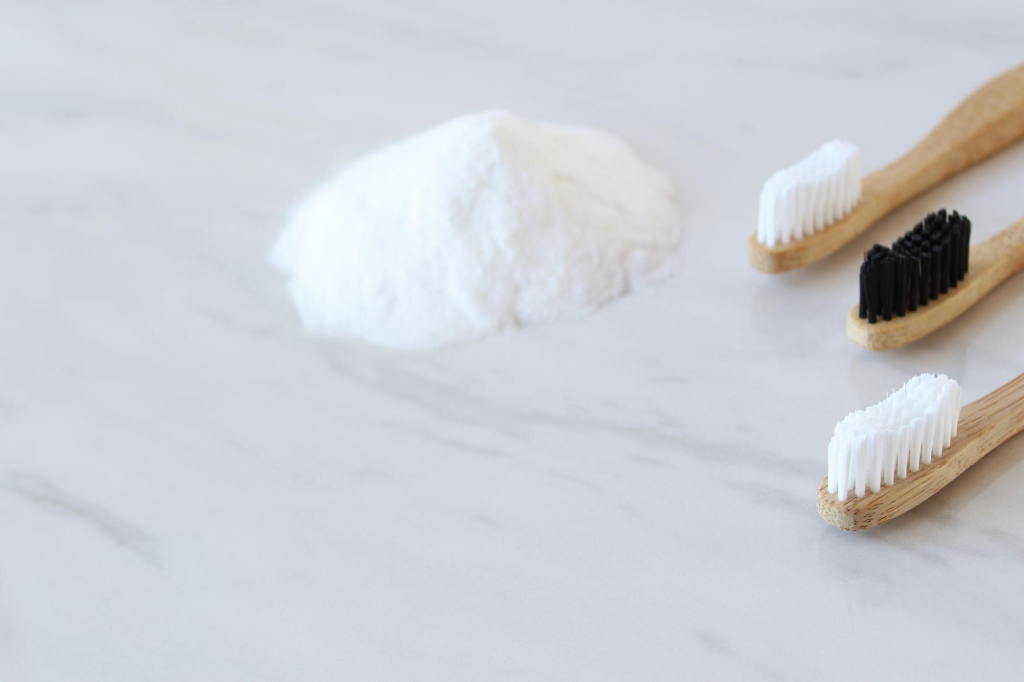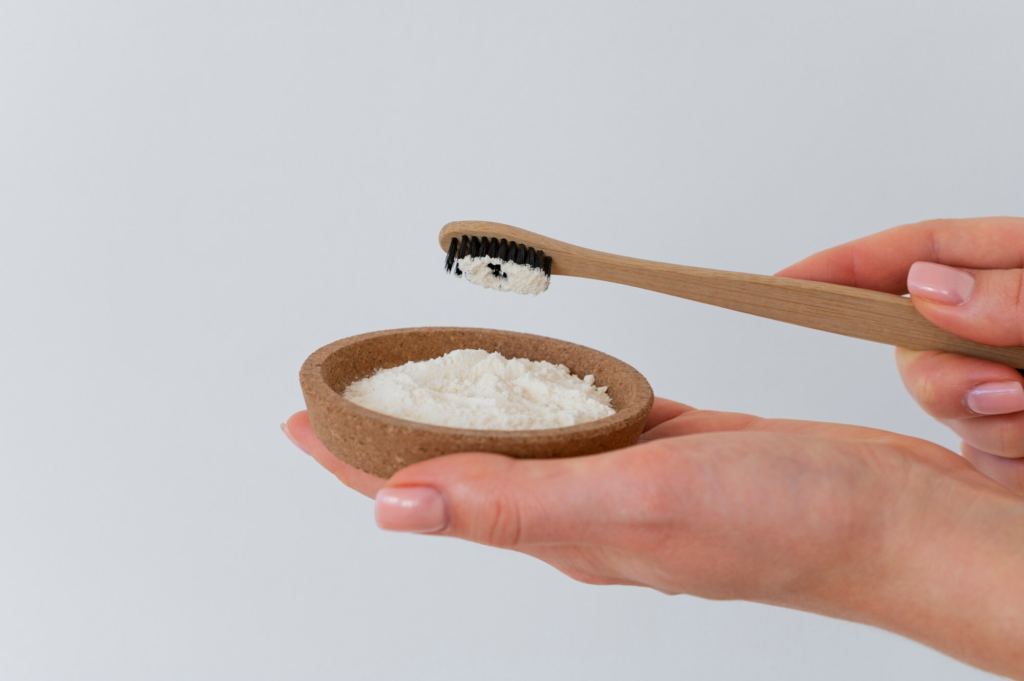In recent days, TikTok has become a hub for health hacks and home remedies, with users constantly sharing their latest discoveries. One such trend catching attention is the use of baking soda for gum pain.

Short videos with people mixing baking soda into pastes, applying it to their gums, and claiming immediate relief have sparked curiosity among millions.
As a result, searches for “baking soda for gum pain” have surged on Google, with people eager to understand if this simple pantry ingredient can really soothe aching gums.
Understanding Gum Pain: Causes and Symptoms
Before exploring baking soda as a remedy, it’s important to understand what causes gum pain in the first place. Gum pain can range from a mild irritation to severe discomfort that interferes with eating, drinking, and even talking.
The most common causes of gum pain include gingivitis, periodontitis, mouth ulcers, tooth infections, trauma from brushing too hard, poor oral hygiene, and even nutritional deficiencies.
Some individuals may also experience gum pain as a symptom of hormonal changes, particularly during pregnancy or menstruation.
Symptoms typically include swelling, redness, bleeding, tenderness, and sometimes bad breath. When these signs appear, people often look for quick, affordable, and easy solutions—especially when they don’t have immediate access to dental care. That’s where natural remedies like baking soda come into play.
What Is Baking Soda and Why Do People Use It?
Baking soda, also known by its chemical name sodium bicarbonate, is a white crystalline powder commonly used in baking. But beyond the kitchen, it has long been praised for its versatility in cleaning, deodorizing, and personal care.
In the realm of oral health, baking soda has been used for decades as a gentle abrasive to help remove plaque and stains from teeth. It’s also found in many over-the-counter toothpastes.
Its appeal lies in its alkaline nature, which helps neutralize acids in the mouth. Since harmful bacteria that cause gum disease thrive in acidic environments, baking soda’s ability to raise pH levels in the mouth can potentially reduce bacterial growth.
Moreover, its anti-inflammatory and mild antiseptic properties contribute to its effectiveness as a temporary home remedy for gum discomfort.
How Baking Soda May Help With Gum Pain
The growing interest in using baking soda for gum pain isn’t just based on anecdotal TikTok videos—there’s some science to back it up.
Baking soda’s alkaline composition helps neutralize the acid that bacteria produce in the mouth, thereby minimizing gum irritation and slowing down bacterial growth. This can help ease inflammation and reduce pain in the gums.
Additionally, baking soda acts as a mild abrasive, which can help clean the surface of teeth and gums without being too harsh, especially when used in moderation.
This helps reduce plaque buildup—a key contributor to gum pain and gingivitis. Some users also note that applying a baking soda paste provides a soothing, cooling effect, possibly due to the salt-like nature of sodium bicarbonate.
While it’s not a long-term cure, it may offer temporary relief for those experiencing minor gum discomfort.
How to Use Baking Soda for Gum Pain
Using baking soda to ease gum pain is relatively simple and can be done in a few different ways. One common method is to create a paste by mixing a small amount of baking soda (about half a teaspoon) with a few drops of water.
This thick paste can then be gently applied to the affected area using a clean finger or soft toothbrush. Let it sit for 1–2 minutes before rinsing thoroughly with water.
Another approach is to use baking soda as a mouth rinse. Dissolve about half a teaspoon of baking soda in a glass of warm water, stir it well, and swish it around your mouth for 30 seconds to a minute before spitting it out. This can help reduce inflammation and freshen breath at the same time.
Some TikTok videos also show people adding baking soda to their regular toothpaste. While this isn’t harmful if done occasionally, it’s important to avoid overuse, as frequent application can lead to enamel erosion and gum irritation.
Safety Tips and Precautions
While baking soda can be a helpful tool for managing minor gum pain, it’s not without risks if used improperly. Its abrasive texture, though mild, can still wear down tooth enamel and irritate sensitive gums if applied too frequently or too aggressively.
Dentists generally recommend limiting the use of baking soda-based treatments to 2–3 times a week, and always using gentle pressure when applying.
It’s also important not to swallow baking soda, especially in large quantities, as it can lead to digestive upset and imbalances in body electrolytes.
People with high blood pressure, kidney problems, or those on sodium-restricted diets should consult a healthcare professional before using baking soda as a remedy.
Additionally, baking soda should not be used as a substitute for regular oral hygiene. Brushing twice daily with a fluoride toothpaste, flossing, and visiting the dentist regularly remain essential practices for maintaining healthy gums.
What the Experts Say
Many dental professionals recognize the benefits of baking soda in oral care but caution against relying on it as a standalone solution.
According to the American Dental Association (ADA), toothpastes containing baking soda can be effective at plaque removal and stain reduction when used as part of a comprehensive oral hygiene routine.
However, if gum pain persists for more than a few days, it’s critical to see a dentist. Persistent or severe gum pain may be a sign of underlying conditions like gum disease, abscesses, or even systemic health issues.
A dental professional can provide an accurate diagnosis and recommend proper treatment, whether it’s a professional cleaning, antibiotics, or other interventions.

When to Seek Professional Help
While baking soda may offer short-term relief, it’s not a cure for serious dental problems. If your gum pain is accompanied by other symptoms like pus, fever, toothache, bleeding that doesn’t stop, or swelling that spreads, don’t delay getting medical attention.
These signs may indicate a more serious infection that needs prompt treatment. Moreover, people with braces, dental restorations, or very sensitive teeth should be cautious with baking soda, as it might interact with dental materials or exacerbate sensitivity.
Natural Alternatives to Baking Soda
If you’re looking for other natural options besides baking soda, there are a few alternatives that might help with gum pain.
Saltwater rinses are one of the oldest and most effective remedies for gum inflammation, helping to kill bacteria and soothe tissues.
Aloe vera gel, known for its anti-inflammatory properties, can be gently massaged into sore gums for relief. Turmeric paste, due to its anti-inflammatory and antimicrobial properties, is another option some people find helpful.
Clove oil, though more potent, is also widely used for tooth and gum pain and has strong analgesic properties. However, just like with baking soda, these remedies are best used as supplementary treatments, not replacements for professional dental care.
Final Thoughts: Is Baking Soda Worth Trying for Gum Pain?
With its recent rise in popularity on platforms like TikTok, baking soda has captured the attention of many seeking a fast and natural way to ease gum pain.
Backed by its alkaline, antibacterial, and anti-inflammatory properties, baking soda can indeed offer temporary relief for mild gum discomfort when used appropriately. It’s inexpensive, easy to use, and generally safe for most people in moderation.
That said, it’s not a magic solution or a replacement for consistent dental care. If you’re experiencing frequent or intense gum pain, it’s essential to identify and treat the root cause, not just mask the symptoms.
Baking soda may serve as a helpful addition to your at-home oral care routine, but nothing replaces the expertise of a qualified dental professional.
So yes, give baking soda a try if you’re dealing with mild gum irritation and looking for a quick DIY remedy. But remember: trending TikTok hacks are no substitute for long-term oral health strategies and expert advice.
Always use good judgment, prioritize your dental hygiene, and don’t hesitate to reach out to your dentist if the pain persists.